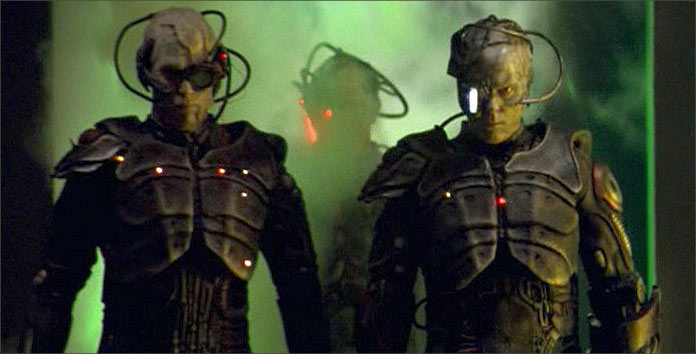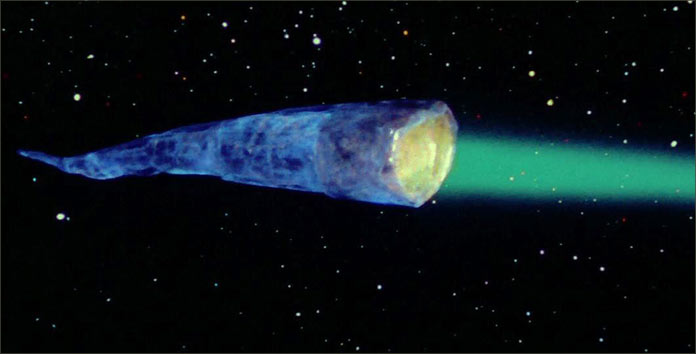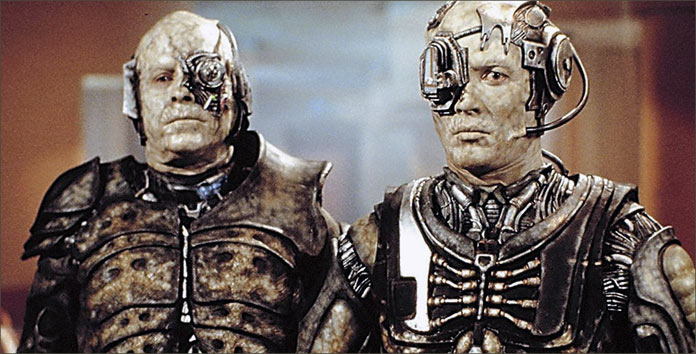The Borg — half organic being and half machine, they are the most feared race in the known galaxy.
In their relentless quest for technological perfection, they have destroyed entire star systems, enslaved countless peoples, and, in a single brutal attack, decimated Starfleet’s mightiest vesels.
Only a final desperate gambit by Captain Picard and the U.S.S. Enterprise crew stopped the Borg from conquering the entire Federation. And now they have returned.
We’re counting down to the January 2020 return of Jean-Luc Picard by revisiting some of the pivotal stories about the beloved Starfleet captain from across the last three decades of Star Trek: The Next Generation published fiction.
Welcome to the next entry in our retro review series Prelude to Picard!
* * * *
Before Seven of Nine, before the Borg Queen, before Star Trek: First Contact — and even before “I, Borg” — Peter David’s 1991 giant novel novel followed “The Best of Both Worlds,” growing the mythology of the Borg in Star Trek: The Next Generation — Vendetta, putting Picard and the crew of the Enterprise right back in their sights.
The events of the book are set sometime during the back half of the fourth season of The Next Generation, when the wounds of Starfleet’s destruction at Wolf 359 and Picard’s assimilation as Locutus are still relatively fresh in the minds of the Enterprise crew.
In the opening act of the book, the assimilation of a planet by the Borg is stopped… by a Planet Killer, similar to the one destroyed by Captain Kirk’s Enterprise back in “The Doomsday Machine.”

The Planet Killer, which Vendetta reveals was originally built as a weapon to defeat the Borg by the Preservers, is piloted El-Aurian survivor Delcara, who saw two homeworlds destroyed by the Borg and has been driven mad with thoughts of revenge. Picard, who had an ethereal encounter with Delcara as a cadet at Starfleet Academy that left a strong imprint upon him, is dispatched to investigate this new enemy of the Borg.
Finding that the cure may be worse than the disease, given the Planet Killer’s destruction of innocent populated worlds in its quest to hunt down and destroy the Borg, Picard sets out to stop the destruction on both sides. Meanwhile, the Borg have selected a new voice to replace Locutus: a hapless Ferengi who stumbled across a Borg armada sent to confront the Planet Killer.
With the help of two other starships, and featuring cameos by Lt. Commander Shelby and Doctor Pulaski, the Enterprise must face down not only a Planet Killer, but three Borg Cubes at the same time. What a ride!

Vendetta is a shockingly bold novel for 1991. Given that, at the time, there was a strong mandate from production that the events of the books should not interfere or change in any way what was depicted on screen, Vendetta is well ahead of its time.
Weaving together multiple elements of canon – the Borg, the Planet Killers, Guinan, the Preservers – into a rip-roaring narrative that thunders along from beginning to conclusion is the kind of feat we would expect from more recent novels (see the “Destiny” trilogy for example) than the more staid editorial regime of the early 1990s.
But here it is; bold, loud Vendetta gives the fans exactly what they wanted (at the time): more Borg.
Through Vendetta, we get some significant additions to the mythology of the Borg themselves. Not everything totally lines up with what was established about the Borg in later canon, but it’s surprising how well this novel holds up given only “Q Who?” and “The Best of Both Worlds” had aired at this point.
The book is also not afraid to explore ground that later Star Trek series would also cover. One key subplot of the novel involves rescuing and de-assimilating a human female who has spent many years as a Borg — sound familiar?

Unlike Seven of Nine, though, the story of Reannon Bonaventure is not a happy one. The Borg of Vendetta are as menacing as we ever see them, a totally malevolent force who steal the souls of those they assimilate. Not all Star Trek has succeeded at paying off the idea that the Borg are scary — Star Trek: First Contact is most successful at it on screen — but Vendetta sure does.
If there is one disappointment to this book, it is that Picard does not spent too much time grappling with his own experience with the Borg. Given that his trauma as Locutus is so close in time to when this book is set, a little more reflection from the character about going up against the Borg again so quickly would have been welcome.
We do get some great Picard moments — facing down the Ferengi Borg in a brutal combat scene, for example — but Picard’s journey in this novel has less to do with the Borg and more to do with romantic feelings for Delcara.
Delcara mostly works as a character, though the love story between Picard and Delcara feels pretty forced. She is obsessed with her vendetta against the Borg, but in a pitiable way more than coming off as a straight villain. As a result, the final fate of her and the Planet Killer, accelerating to warp 10 and being stuck in an infinite time loop, is a solemn ending more than a jump for joy moment.

There certainly are some fist pumping moments in this book, as well as some really cool concepts to visualize. Pitting a Borg Cube against a Planet Killer is such a neat concept, but it is also one that could have been executed like bad fan fiction.
Vendetta is definitely not that; it balances being a celebration of the best of The Next Generation up to that time with telling a thoughtful story on right and wrong, and whether the ends justify the means.
If Reunion felt like a good episode of The Next Generation, then Vendetta feels like a great TV movie. David gets the characterizations of our heroes just right, is not afraid to pull toys out of the canon toy box and set them against each other, and holds the reader’s attention through the whole course of this complicated, but ultimately very fulfilling story.
